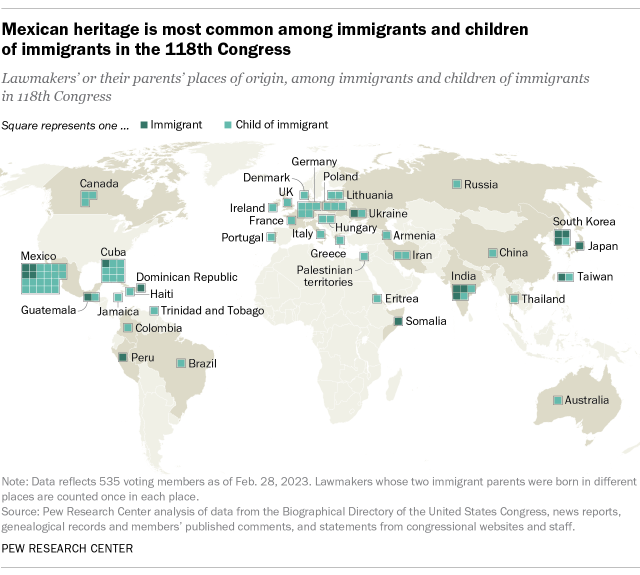Bloomberg Línea — The presence of immigrants and children of immigrants in the U.S. Congress during the current term reached a historic high of 81 people, according to data the Pew Research Center compiled from the U.S. Congressional Research Service.
This accounts, says the Pew Center, for at least 15% of the nation’s voting members of Congress being born outside the U.S. or having at least one parent who was born abroad.
The U.S. Congress currently consists of 535 members in the Senate and the House of Representatives.
As for the origin of the legislators, the Pew Center says that most of those who belong to this group have roots in American, European or Asian countries.
One finding reported by this research is that legislators whose family background is in the Americas outnumber those whose region of origin is Europe. According to the center, those who have their origin in Mexico total 22, which represents the highest number of any country. In second place among countries of origin is Cuba (with nine), Germany (six) and India (five).
Under the US Constitution, an immigrant who assumes office in the House must have been a citizen of that country for at least seven years, be 25 years of age or older, and live in the state where he or she was elected. Nine years of citizenship is required to serve in the Senate, and the member must be 30 years of age or older and live in the state represented when elected.
There are 18 foreign-born voting members, of which 17 are in the House of Representatives and one in the Senate. Together, they represent 3% of all voting members in both legislative chambers. In addition, at least 63 additional legislators (47 representatives and 16 senators) have one or more immigrant parents. Overall, these children of immigrants make up 12% of the House and Senate, according to the Pew Research Center report.
In terms of origin, Central America has overtaken Europe as the region of origin of the largest number of immigrant legislators or descendants of immigrants. Three out of 10 members are from Central American countries, while a quarter (26%) are of European origin and 17% are of Asian origin and 16% of Caribbean origin.
Twenty-two are of Mexican origin, the largest non-white group in Congress, followed by Cuban origin, totaling nine legislator, Germany with six and India with five. Some legislators meanwhile are the offspring of parents from two different countries.
However, the number of foreign-born legislators remains below historic highs. “Around 8% of legislators were immigrants in the 1887-1888 legislature, during a wave of immigration from Europe to the US. The proportion of immigrants in Congress is also below the proportion of people born abroad within the US population, which was 13.6 % in 2021″, the Pew Research Center states.
--This article has been updated in several paragraphs to more accurately reflect the original source data.




